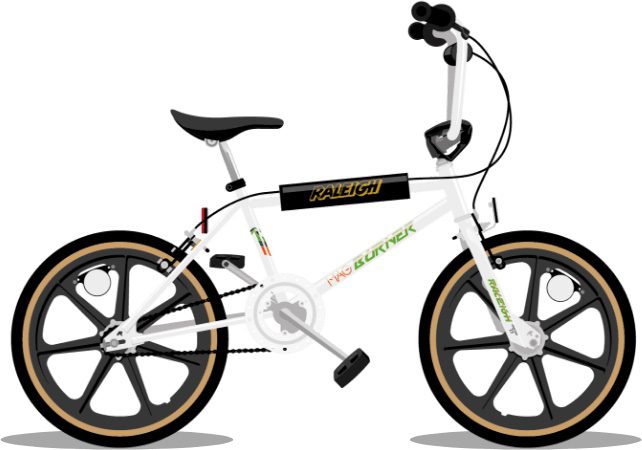The first bicycle I remember being truly excited about was a Raleigh Mag Burner MK2 in white.
For the next couple of years, I imagined myself as one of the kids riding BMXs in ET.
Many years later I went to the University of Nottingham and lived in a house not far from the old Raleigh factory on Lenton Boulevard, which had been turned into the Marcus Garvey Centre.
Raleigh was founded in 1887, and by the middle of the 20th Century was manufacturing a million bikes a year. In 1980, the Dutch rider, Joop Zoetemelk, won the Tour de France on a Raleigh.
Those heady days are long gone as the bicycle market has fragmented into a hundred niches, from folding commuter bikes to mountain, road, touring and hybrids.
With an 11% share of the UK market, Raleigh has fallen behind more popular brands like Specialized, Brompton, Trek, Canyon and Giant.
Owned by the Netherlands’ Accell Group since 2012, Raleigh continues to make vintage-style bikes for the retro market, along with children’s bikes, but the company is making a determined shift to practical cargo bikes and e-bikes, which are fitted with small electric motors to assist pedalling.
This year Raleigh anticipates selling more e-bikes than standard bikes for the first time – which analysts think equates to around 18,000 bikes.
All this is happening in the context of a sharp 22% year-on-year decline in overall bike sales, a natural consequence of the spike in purchases during lockdown.
“We feel like this is the next evolution in Raleigh as a brand,” Lee Kidger, Raleigh’s managing director in the UK told the FT. “We do believe that electric bikes and electric cargo bikes are the future.
“The Raleigh brand can continue to carry us forward, especially if you look at the age demographic of the people that are buying electric bikes.”
This acknowledgement of the brand’s heritage accounts for why it continues to sell bikes inspired by its past.
“We do them as brand activation, rather than a way to make money,” Kidger has explained.
This is music to the ears of Raleigh enthusiasts.
“Obviously, I appreciate that the e-bikes and cargo bikes in terms of active travel are necessary and essential,” says Michael O’Reilly, chair of the Raleigh Chopper Show.
“[But] I think it’s fantastic that at last Raleigh has recognised the heritage element.”










